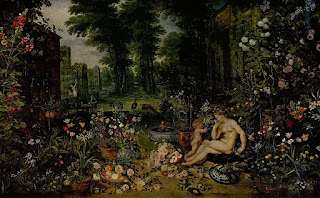Garden of the Witch - Part Two
Real witches are involved in transforming the world for the better.
Perhaps you are doing the same, or at least believe yourself to be doing so?
But what does it actually mean to transform the world?
Where is the best place to start, if not in a garden?Perhaps you know something about the culinary herbs known as oregano, thyme, sage and mint.
Perhaps you regard this grimoire as quaint.
You may even regard witches as quaint.
You may regard the houses and gardens of witches as quaint.Do you have much knowledge about relatively natural ways of living?
Perhaps you are confused about the semantics of naturalness, and quaintness.
Perhaps your ideas about naturalness, and quaintness, have been influenced by Romanticism.
What have you been learning about sublime splendour and hidden danger, and how?You may have acquired ideas about quaintness mainly through fiction.
But which ideas about witches, and their environments, have you acquired through fact?
What do you know about the etymological and semantic associations of quaintness?
Who is your teacher in relation to this grimoire, and how do you know that person is suitably qualified?
Have you visited that person's garden?
Have you tasted any food prepared by that person?
Have you studied crafts with that person?Did that person acquainted you with various levels of existence before acquainting you with this grimoire?
Did that person acquaint you with comparative perceptions of odours, images, textures and sounds?
Did that person acquaint you with the problems associated with invasive species, including humans?
Are you sure that person is adequately addressing the grotesque, particularly regarding instability in the most important planetary systems?Are you sure that person has been helping to guide you on authentic explorations, including in and around Frugality Cottage over the past few months?
What have you been learning about the cottage and quaintness?
Did you require a key to enter Frugality Cottage today?Did you wash your hands before touching the garden gate?
Did you wipe your feet before turning the handle on the front door of the cottage?
Have you been learning much about the cottage and time?
In the three little kitchens of Frugality Cottage, and in the extensive ethereal gardens, many important experiments are happening.
Perhaps your teacher is one of the world's most suitably qualified sand witches.
What do you know about xeriscaping?
Perhaps you know very little about sustainable gardening and sustainable landscaping and sustainable experimentation.Perhaps you know very little about useful garden structures, including garden buildings.
Perhaps you know very little about garden design, particularly in relation to foodscaping, privacy and productivity.
Perhaps you know very little about the most suitable relationship between sustainable gardening and sustainable freedom.
There is much to learn about ecological design, sustainable designing, sustainable landscape architecture and sustainable engineering.
What do you already know about climate-friendly gardening, and how do you know it?What do you already know about climate-friendly eating?
Where, if anywhere, have you developed a victory garden for human survival in the context of climate change?
What do you know about sustainable drainage systems, urban forestry and urban farming?
When do you most usually sit on a patio, learning about productive gardens and their sustainability?
- Witch Weather - Part One
- Witch Weather - Part Two
- Witch Weather - Part Three
- Witch Weather - Part Four
Perhaps you regard gardens as therapeutic, or at least some gardens.
How therapeutic are digital gardens, in your view, and for whom?
How therapeutic are physical gardens, and how do you know?
What do you know about physic gardens?What do you know about psychic gardens of the Gnostic variety?
You may regard medicinal plants as mainly associated with the physical body, except when claimed benefits are merely a placebo.
What is your understanding of self-healing through the mind-body relationship?
What do you know about the limits of self-healing?What do you know about the boundaries of material reality?
What do you know about the boundaries of intellectual reality?
How do objects of the mind influence your perceptions of sensory experiences?
What do you know about the boundaries of spiritual reality?
What do you know about achieving and maintaining justifiable awe?Have you been virtually exploring the cottage garden of Frugality Cottage for any reason in particular recently?
Perhaps you have been seeking to learn more about the cottage and freedom.
What have you been learning, in the cottage and elsewhere, about investing in the responsible initiation of students of enlightenment?
Students of the hylic variety are rarely able to progress to the psychic level of quaternary training. They therefore lack the ability to achieve the pneumatic level of enlightenment.What sort of student do you regard yourself as being at present, especially metaphysically?
What have you already been learning about the intelligent witchcraft of well-informed kindness?
How is your philanthropy associated with knowledge about gardening and kindness and intelligence?
What do you know about the history of emotions?
What do you know about sensory history?
What do you know about your psyche?
Where have your investigations of the subject taken you, and why, and who have you encountered along the way, and how?How, in fact, have you been planning to improve the planet?
- Planning to Improve the Planet - Part One
- Planning to Improve the Planet - Part Two
- Planning to Improve the Planet - Part Three
- Planning to Improve the Planet - Part Four
- Planning to Improve the Planet - Part Five
- Planning to Improve the Planet - Part Six
And how regularly have you been updating those plans in accordance with the best available science, philosophy and knowledge of history?
Perhaps your planning is associated with the interests of tourists.
Perhaps your planning is associated with the interests of journalists.
What, if anything, have you discovered about your psyche through the history of religion and through philosophical writings and through mythology and through Frugality Cottage?
How is your psyche related to your character, and how do you know?Perhaps you are eager to experience Cupid's garden rather than the garden of the witch.
How do you compare Cupid with a witch, and with your character, and why?
Perhaps you are more interested in the gardens of castles and palaces rather than the gardens, and character, of cottages.
- The Cottage and Character - Part One
- The Cottage and Character - Part Two
- The Cottage and Character - Part Three
- The Cottage and Character - Part Four
Perhaps you are more interested in celebrating weddings than facing up to the problems confronting the world.
Perhaps you are seeking to enjoy an Australian idyll rather than the reality of life in regions susceptible to extreme weather events.
Real witches are dedicated to supporting the public interest consistently well.
Are you sure you are willing to face reality wherever you happen to be?
- An Australian Idyll - Part One
- An Australian Idyll - Part Two
- An Australian Idyll - Part Three
- An Australian Idyll - Part Four
Perhaps you have been reading the guidebook in the library of Frugality Cottage.
What have you discovered about intelligently frugal pleasures, and how?
- Intelligently Frugal Pleasures - Part One
- Intelligently Frugal Pleasures - Part Two
- Intelligently Frugal Pleasures - Part Three
- Intelligently Frugal Pleasures - Part Four
What have you discovered about hardscapes and softscapes in landscape design?
Perhaps you have an escapist attitude towards design rather than one devoted to preventing disasters.
Science not only reveals knowledge but also an awareness of where knowledge is lacking.
Whenever evidence suggests further research is necessary in order to address potential problems as well as actual ones, wise people include such research in their planning.
Yet unwise people unfortunately disregard actual problems as if those problems are only potential ones, and even unlikely to be problems at all.What do you know about liminality in relation to problems, and how do you know it?
What do you know about the liminality of walled gardens?
What do you know about the liminality of extending seasons?What do you know about the liminality of seasonal transitions?
What have you been learning about intelligent frugality and liminality in and from Frugality Cottage, and how?
- Intelligent Frugality and Liminality - Part One
- Intelligent Frugality and Liminality - Part Two
- Intelligent Frugality and Liminality - Part Three
- Intelligent Frugality and Liminality - Part Four
What have you been learning about shrubbery, and where?




























Comments
Post a Comment